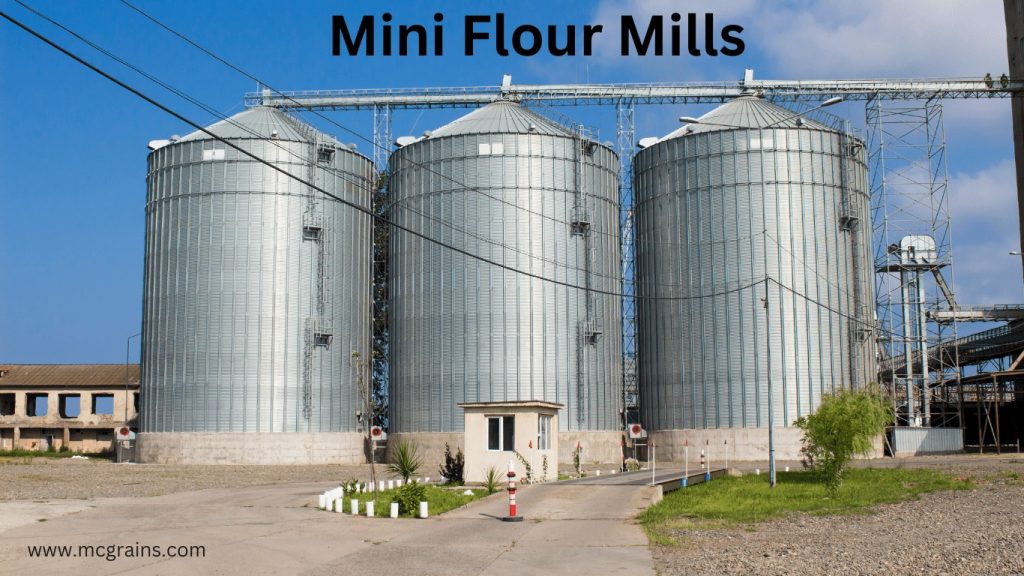Why the launch of a mini flour mill should be your next big step. Have you ever dreamt of becoming an entrepreneur, but the capital needed for a start was a letdown? Are you interested in ways to introduce value-added products to the wheat you may be growing on your farm? Well, you may need a mini flour mill for this purpose.
This guide covers the entire mini flour mill concept. It explains what they are, how to operate them, and how they can help your business dreams. It is tiny, it is effective, and it can be the foundation to a successful business venture.
A mini flour mill is a small version of a conventional flour mill. It processes a limited amount of wheat to produce flour. Mini flour mills are better than large industrial ones. They need less money to start and have lower running costs. They are ideal for small business people and farmers. They are also good for home use by small-scale bakers who want to make their own fresh flour.
Exploring the Advantages of a Mini Flour Mill
There are some benefits of mini flour mills . They are cost-effective, allow for customized production, and enhance quality control. Mini flour mills are best for small businesses. They are efficient and very flexible.
Affordability:
These smaller mills are inexpensive to build and run. Mini flour mills are cost-efficient. They need a small investment to install and have low operating costs. So, they are suitable for small entrepreneurs.
Compact Size:
They do not take up much space. So, they can place them where larger plants cannot due to lack of space. This small plant is easy to install. It’s suitable for a small-plant milling system.
Ease of Use:
It has a friendly UI. Even novice users can operate it. These mills are easier to run and need no skill. So, they solve a problem with a lack of skilled labor.
Fresh Flour:
Produce fresh flour to order. It will taste better and be of higher quality than the already processed one. Mini flour mills are small. They produce fresh, high-quality flour on demand. This improves the product’s quality.
Guide on how a Mini Flour Mill Works
Before discussing its process, let me describe, in basic terms, how this mini flour mill operates. Here’s a step-by-step breakdown:
- Cleaning:
Wash the wheat and separate any small stones, dirt, and chaff from it.
- Conditioning:
The wheat is then conditioned by spraying a little water. This hardens the brain and loosens the endosperm.
- Milling:
The conditioned wheat is conveyed to the mill. There, it is ground to produce flour.
- Sieving:
The flour is sieved to sift the fine flour from the bran and other products that are also produced.
- Packaging:
Last but not least, we pack the flour well for sale or home use.
Exploring the Various Types of Mini Flour Mills
Mini flour mills are of different types. They have different specs and features. Knowledge about these types will enable a person to make the right decision when buying one.
Stone mills:
These mills employ a pair of stone wheels to mill the grain, particularly the wheat. Stone mills are slower and more labor-intensive than steel roller mills. But, they produce a finer flour.
Roller Mills:
Roller mills have several rotating cylinders. They grind the wheat into flour. Compared to stone mills, these are fast and efficient. They’re best for large-scale businesses.
Hammer Mills:
In hammer mills, hammers are effective in pulverizing wheat. They are not very popular but are quite useful, especially in producing coarse flour.
How to Choose the Right Mini Flour Mill to Buy
When buying a mini flour mill, consider these factors. Find the daily flour amount needed or the flour needed to produce each day. This would enable you to select a mill that has the correct level of capacity for your requirements.
- Mini flour mills can be powered by electricity, diesel, or manually. Choose the best electrical source for the site’s needs.
- How easy will it be to maintain? Some mills need more frequent cleaning and part changes than others.
- Of course, it is crucial not to migrate from your budget plan, but it does not mean you should go for a cheap product. It’s wise to use or buy a cheaper mill. But it’s unwise to. It costs a lot to repair it each time it breaks down.
Essential Guide to Starting a Mini Flour Mill Business
Starting a mini flour mill is a good business idea. But you should make a solid plan before starting. Here are the key steps you need to take:
Market Research:
Hence, try to appreciate the demand rate for flour on the spot. List customers you think may buy your product and other players you believe pose a threat in the market.
Business Plan:
Most importantly, create a plan. It must define your objectives, target clients, prices, and revenue sources.
Legal Requirements:
Get the licenses and permits to run the business. This may include a food handling certificate and a regional business license.
Location:
Examine a site that is most appropriate for constructing a mill. Access should be granted to both suppliers and customers simultaneously.
Sourcing Wheat:
We must find sources of good-quality wheat. This means considering local farmers or wholesalers. It will save you from dealing with others before getting your goods.
Marketing:
Create a marketing plan for your flour. This could mean social media, local ads, and the company’s source for its bake, such as local bakeries.
Challenges You Might Face When Operating a Mini Flour Mill
Like any other business, managing a mini flour mill also has its own unique problems. Knowing these challenges can help you prepare and find solutions. Here are some of the challenges you can expect to encounter most often when operating a mini flour mill:
Supply Chain Issues:
Wheat supply may be sporadic. This disrupts production cycles. One way of minimizing this risk is by establishing connections with several suppliers.
Competition:
Large mills are more efficient. Their flour is cheaper than that of small mills. To compete in the market, one must rank quality. Freshness is especially important.
Regulatory Compliance:
We must comply with the food safety standards. So, it is easy to see that regular audits and good record-keeping can help you avoid legal troubles.
Mini Flour Mill vs. Large-Scale Flour Mill: More so, which is better?
Here you may have the question of whether a mini flour mill is good for you, or if it is more beneficial than a large mill. Here’s a quick comparison to help you decide:
Cost:
They have low investment costs to buy and operate mini flour mills. They are, but, given a lower production capacity.
Flexibility:
Mini flour mills are more flexible than larger ones. Their production capacities adapt to fit the situation’s demands.
Scalability:
The mini flour mills are efficient for small traders. But, they cannot supply large markets.
Product Quality:
Both mini and large mills can produce high-quality flour. But mini-mills can make fresh flour as needed.
FAQs
Q. 1 What is a mini flour mill?
A mini flour mill is a cheap, small machine. It can process a little wheat. It is useful for small businesses and homeowners.
Q. 2 In what way does a mini flour mill of 1,000 M.T. per day differ from a large-scale mill?
Mini flour mills cater to small production with compact, affordable designs. Large mills operate on a grand scale for massive production, reducing costs.
Q. 3 What are some of the factors that I need to consider when making a buy of a mini flour mill?
Cylinder diameter: Bearing in mind the mill’s capacity, power source, and maintenance cost, among others. It only grabs the needful and is affordable according to your line of production.
Q. 4 Whether you may start a mini flour mill for commercial purposes or not.
Of course, mini flour mills for small commercial use produce high-quality, fresh flour. They do so with lower investment and operating costs.
Conclusion
A mini flour mill is a cheap, small machine. It can process a little wheat. It is useful for small businesses and homeowners. Conclusion:
The mini flour mill is a good option for those with limited funds who want to start a business. It includes flexibility, affordability, and easy operation. These allow young and small businesspeople to start a venture. Like any business, self-employment needs proper planning, market research, and quality assurance. By following the best practices in this guide, a person is ready to start a mini flour mill business.
Hence, you are curious whether you are now prepared to start your own mini flour mill. If managed well, you could have a thriving business. It would benefit your community and make you financially secure.
Thus, it is vital to make this article better than the competitors’. It must be informative, engaging, and more detailed. It details how to start and manage a mini flour mill. It also has useful information and is a handy tool for those starting a business.



